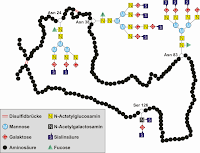Teaching New Tricks to an Old Dog: Erythropoietin (Epo) "Doping" to Treat the Metabolic Syndrome!?
 |
| Figure 1: Schematic illustration of the molecular structure of EPO (Wikipedia) |
Foskett et al. followed up on the results of recent studies which suggest a role of Erythropoietin (Epo) signaling in the regulation of body weight, fat mass, and glucose metabolism (Hojman. 2009 / Katz. 2010). They fed a group of mice the standard hypercaloric (5240 kcal/kg) "high fat" diet containing 60 kcal% fat to induce what researchers consider a good model for the metabolic syndrome, i.e. so-called "diet induced obesity" (DIO) in their lab animals. Additionally, recombinant human Epoetin alpha (Epogen) was administered subcutaneously every other day @ 1000, 600, 300, 150, and 75U/kg for 5 weeks, with saline only injected mice as sham controls. Hematocrit, body weight, body composition, glucose metabolism, food intake, and physical activity were monitored:
[...] Epo doses (1000, 600, 300, and 150U/kg) significantly reduced body weight gain and fatmass, while, only Epo doses of 300U/kg and higher significantly affected glucose tolerance. None of the tested Epo doses showed any detectable effects on food intake, and only 1000U/kg dose significantly increased physical activity [...]What is even more intruoging is the particular effectiveness of the median dose of 300U/kg:
[...] 300U/kg Epo treatment resulted in a slightly more pronounced effect on body fat mass reduction and decreased serum insulin, with total activity levels statistically indistinguishable from the sham control, and slightly lower than those of the 1000U/kg group. [...] A question raised here pertains to the possibility of an optimum effective dose for Epo (300U/kg) in regulating fat mass and insulin levels.As a regular visitor of the SuppVersity you know similar saturation effects from other supplements and ergogenic aids and are familiar with the fallacies of the application of our Western "the more, the better" mentality within dietary, as well as supplement related contexts.
Irrespective of the relatively small dose that is needed to produce profound metabolic effects, further (human) studies are warranted to decide, whether Epo, a pleotropic cytokine that has been discredited as a performance enhancing drug used and abused by professional athletes around the world, will have a future as a pharmacological addition to diet and exercise programs designed to help the approximately one billion overweight and obese people worldwide to shed their unhealthy body fat. Until the exact mechanisms by which Epo regulates fat mass accumulation and glucose tolerance are elucidated, its use aside from its original areas of medical application remains counter-indicated.


